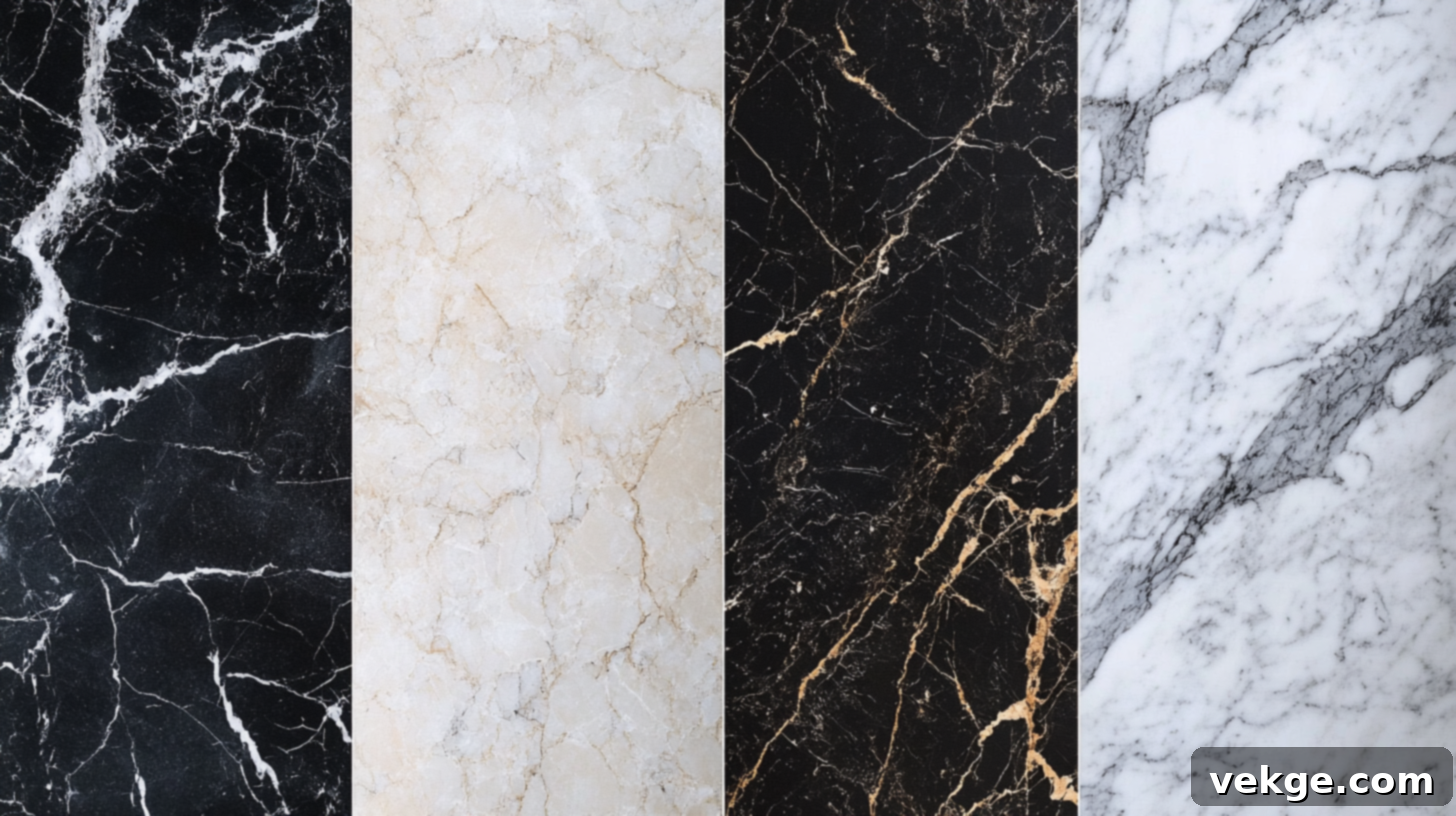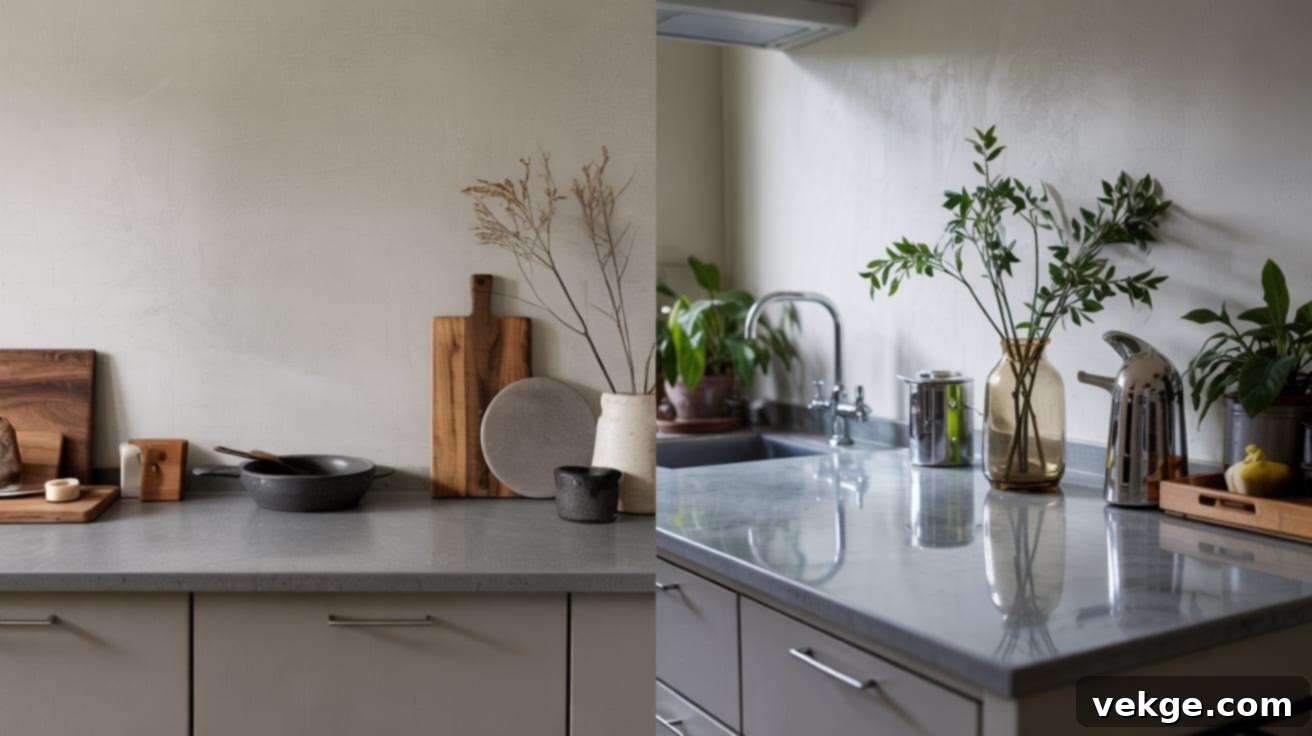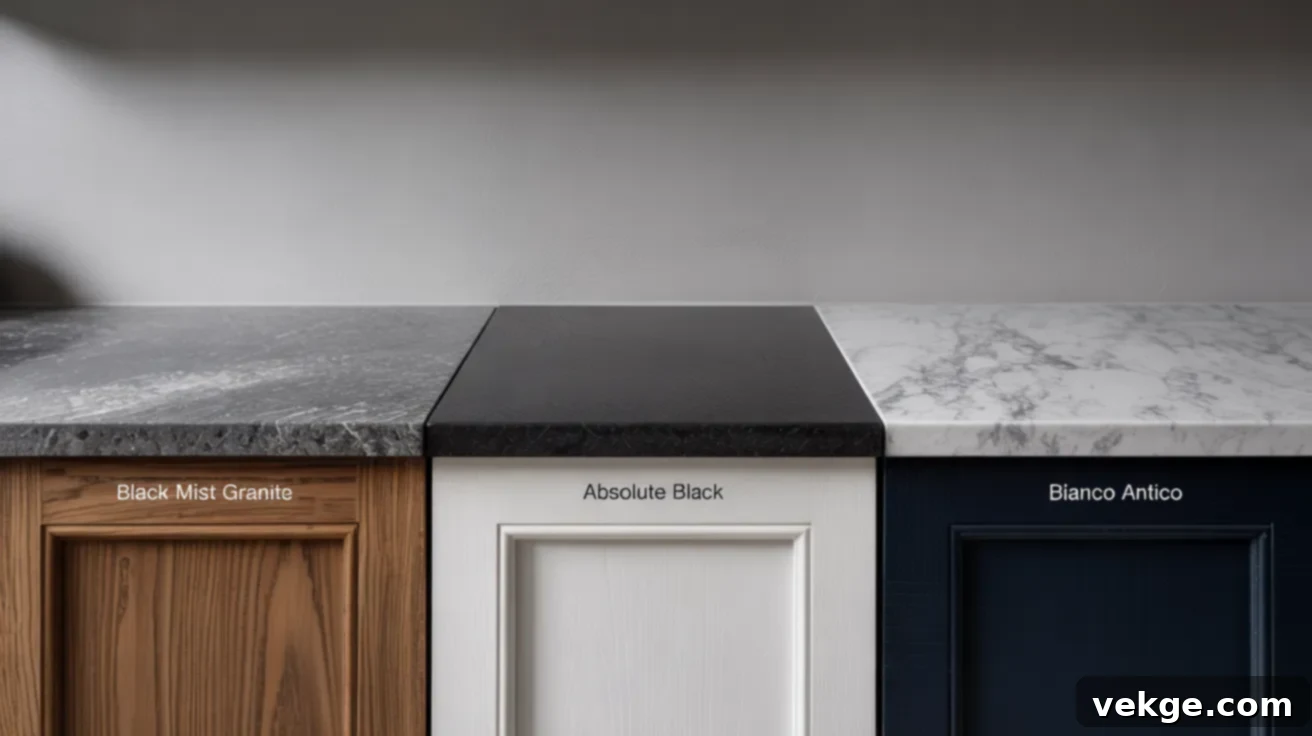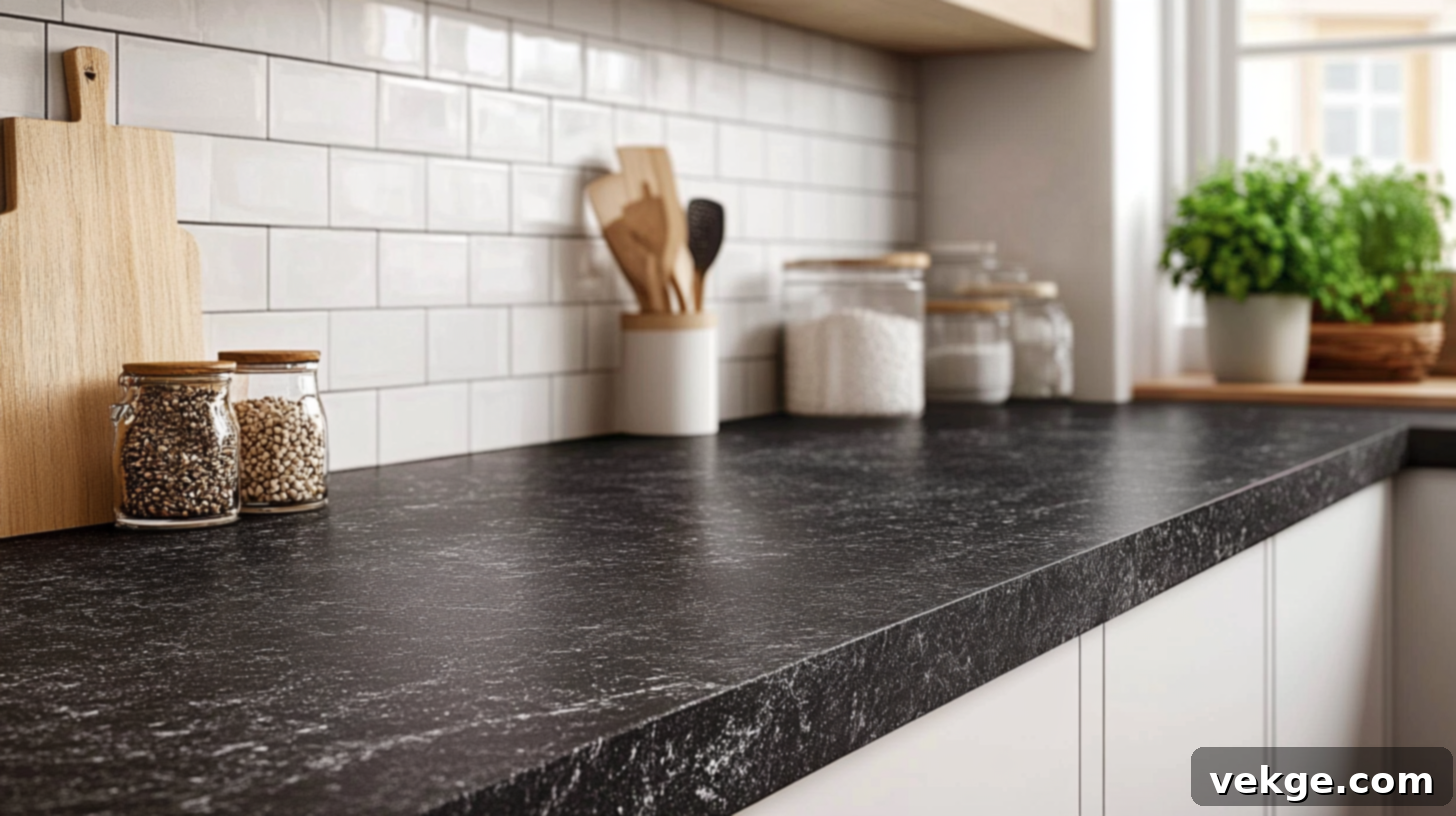The Ultimate Guide to Honed Countertops: Discovering Matte Beauty & Practicality for Your Home
Have you ever run your hand across a stone countertop and admired its soft, natural feel, so different from a slick, shiny surface? That tactile elegance defines honed countertops. These stunning, matte finishes are celebrated for their practicality, timeless beauty, and the warm, inviting atmosphere they bring to any home.
In this comprehensive guide, we’ll delve into everything you need to know about honed countertops. You’ll uncover what truly sets them apart from their polished counterparts, explore which natural stone types are best suited for this unique finish, and learn how to determine if they align perfectly with your lifestyle, design vision, and budget. By the time you finish reading, you’ll possess all the essential information to make a well-informed decision for your kitchen, bathroom, or any space desiring a touch of understated elegance. Let’s embark on this journey to discover the allure of honed surfaces!
What Exactly Are Honed Countertops? Unveiling Their Unique Charm
Honed countertops have rapidly become a sought-after choice in countless modern homes, captivating homeowners with their distinctive appearance and an array of practical benefits. Moving away from the high-gloss surfaces often seen in traditional designs, honed countertops present a softer, more organic feel that resonates deeply with those seeking a refined yet comfortable aesthetic.

Meaning and Appearance: The Art of the Matte Finish
At its core, a honed countertop is a natural stone surface that has been ground down to achieve a smooth, flat finish, but crucially, it has *not* been polished to a shine. The crafting process deliberately stops before the final buffing stage that would produce a glossy, mirror-like surface. This intentional halting of the process results in the signature matte or satin look that defines a honed finish.
This particular finish allows the stone’s inherent beauty and true color to emerge with remarkable clarity, all while significantly reducing light reflection. Unlike polished countertops, which act like mirrors, bouncing light around a room and sometimes creating harsh glares, honed surfaces absorb light. This absorption contributes to a warm, subtle, and inviting aesthetic that many find incredibly cozy and sophisticated. The matte texture not only offers a pleasant tactile experience but also cleverly disguises minor scratches, fingerprints, and smudges that often stand out on highly reflective surfaces, making honed options a superb choice for active, busy kitchens.
Common Stone Types That Excel with Honed Finishes
While almost any natural stone *can* be honed, certain types truly flourish under this treatment, highlighting their unique characteristics in a way that polished finishes cannot. Understanding these options is key to selecting the perfect material for your home:
- Granite: Known for its exceptional durability and resistance to heat and scratches, granite takes on a surprisingly soft and understated elegance when honed. Its speckled or veined patterns become less dramatic and more integrated, offering a natural, rugged beauty that’s perfect for both rustic and contemporary settings.
- Marble: Often associated with luxurious, highly polished looks, marble’s delicate veining and subtle color variations are beautifully showcased with a honed finish. The matte surface reduces the appearance of etching (a common concern with marble) and offers a softer, more antique or industrial feel that is incredibly chic.
- Quartz: While an engineered stone, many quartz manufacturers now offer honed or “suede” finishes. Quartz provides remarkable consistency in appearance, color, and pattern, combined with superior stain resistance and low maintenance needs. A honed quartz surface offers the aesthetic of natural stone with enhanced performance.
- Soapstone: Naturally soft to the touch and renowned for its heat retention properties, soapstone is almost always presented in a honed finish. Its unique ability to develop a beautiful patina over time, coupled with its dense, non-porous nature (making it highly stain-resistant), pairs perfectly with the organic, understated elegance of the honed style.
- Limestone & Travertine: These softer stones naturally lend themselves to a honed finish, which accentuates their earthy tones and porous textures. They are often chosen for a Mediterranean or Old-World aesthetic, offering a distinct warmth and character.
Each of these stones brings its own set of advantages and a distinct character, all united by the appealing matte finish that many homeowners now prefer over traditional polished surfaces for its depth and authenticity.
Key Considerations Before Choosing Honed Countertops: Is This Your Perfect Match?
Before you commit to the elegant world of honed countertops, it’s crucial to weigh several important factors. Your daily routines, maintenance preferences, financial plan, and overall design vision all play significant roles in making the best choice for your home. Let’s explore these considerations in detail.
Your Lifestyle: Balancing Beauty with Everyday Life
Consider the dynamics of your household. Do you have a bustling family with young children who might leave sticky fingerprints, spill drinks, or occasionally drop toys? Or perhaps playful pets that might jump onto counters? If so, you might find solace in the forgiving nature of honed countertops. Their matte surface excels at camouflaging minor scratches, smudges, and the inevitable little imperfections that arise from daily life, making them appear “lived-in” rather than damaged. This means less stress about every tiny mark and more enjoyment of your space.
However, it’s also important to be realistic about maintenance. If you prefer minimal upkeep, be aware that many honed surfaces, particularly natural stones, tend to be more porous than their polished counterparts. This increased porosity means they might require more diligent sealing and can show water spots and oil splatters more readily. While sealing mitigates this, it’s an ongoing task. Think about how much time and effort you are willing to dedicate to regular sealing and prompt cleaning. For instance, a honed marble will require more care to prevent etching and staining than a honed granite or quartz.
Your Budget: Smart Investments for Lasting Style
Financial considerations are always a top priority. In many cases, the finishing process for honed natural stone can be slightly less expensive than the extensive multi-stage polishing required for a mirror-like shine. This potential cost saving on fabrication might free up some budget for other home improvements or allow you to invest in a slightly higher grade of stone than you initially thought possible.
If you admire the soft, velvety look of soapstone but find its premium price tag prohibitive, don’t despair. Explore less costly alternatives with similar aesthetic qualities, such as honed slate, certain types of honed granite (like Black Mist), or even engineered quartz with a matte finish. Many homeowners discover excellent value by remaining open to various materials that can deliver a comparable visual and tactile experience without breaking the bank. Always get quotes for different materials and finishes to compare the overall cost.
Desired Look: Crafting Your Home’s Aesthetic
The ambiance you wish to create in your home is just as vital as functional considerations. If your ideal space is characterized by warmth, natural textures, and a cozy, lived-in feel, then honed countertops are an unparalleled choice. They exude an authentic, grounded charm that can transform a kitchen into the true heart of your home. They feel genuine and inviting under your hands, fostering a sense of comfort and understated luxury.
Conversely, if your dream kitchen boasts a dazzling, modern, or glamorous aesthetic, filled with bright, bold colors and gleaming surfaces designed to make a dramatic “wow” statement, then a polished finish might be more aligned with your vision. Consider which feeling resonates most with you when you envision walking into your kitchen or bathroom each morning – a serene, soft glow or a vibrant, sparkling reflection.
Pros and Cons of Honed Countertops: A Balanced Perspective
Understanding both the advantages and potential drawbacks of honed countertops is essential for making an informed decision. Let’s explore what you’ll undoubtedly appreciate about these surfaces and what aspects might require a bit more consideration.
Key Benefits: The Allure of Matte Surfaces
- Reduced Glare and Softer Light: One of the most immediate benefits of a honed finish is its ability to diffuse light. The matte surface won’t reflect harsh glares, even when direct morning or afternoon sunlight floods your kitchen. This creates a visually calmer and more peaceful environment, reducing eye strain and contributing to a relaxed atmosphere.
- Excellent at Hiding Imperfections: Unlike highly reflective polished surfaces that magnify every tiny scratch, smudge, or fingerprint, the diffused texture of honed countertops naturally camouflages minor wear and tear. This is a significant advantage for busy households, allowing you to actually use and enjoy your kitchen without constantly worrying about maintaining a pristine, unblemished surface. Small imperfections blend into the overall texture, adding to a characterful, “lived-in” aesthetic.
- Natural, Organic Feel: The soft, smooth, yet non-reflective texture under your fingertips offers an incredibly satisfying tactile experience. This natural feel creates a warm, inviting, and grounded vibe that many homeowners find deeply comforting and authentic. It contributes to a sophisticated, understated elegance that elevates the entire space without being overly flashy.
- Versatile Aesthetic: Honed countertops seamlessly complement a wide array of interior design styles, from rustic farmhouse and industrial to minimalist modern and transitional. Their natural, unpretentious appearance makes them a versatile foundation for various design schemes.
Downsides to Consider: A Realistic Look at Maintenance and Appearance
- Increased Porosity and Staining Risk: Many natural stones with a honed finish tend to be more porous than their polished counterparts. This means they can absorb liquids more readily, making them more susceptible to staining from spills like red wine, coffee, oils, or acidic liquids if not wiped up promptly. Regular and consistent sealing is crucial to minimize this risk.
- More Frequent Sealing Required: To protect against stains and maintain their appearance, most natural honed countertops will require more frequent sealing compared to polished ones. While polished surfaces might need sealing once a year (or less), honed surfaces might benefit from sealing every 6-12 months, depending on the stone type and usage. This is an ongoing maintenance task that homeowners must be prepared for.
- Water Spots and Fingerprints May Be More Visible: On some honed surfaces, especially darker ones, water spots, oil smudges, and fingerprints can be more noticeable. While the matte finish hides scratches well, it doesn’t always hide residual marks from liquids or oils as effectively as a highly reflective surface that might diffuse them.
- Subdued Color Vibrancy: The matte finish, by design, doesn’t enhance the vibrancy or “pop” of the stone’s colors in the same way a glossy finish does. If you’re looking for your countertop to be a dazzling focal point with bold, intense colors, a honed finish might appear too understated or muted for your taste. It’s less flashy but offers depth and subtlety instead.
- Etching on Calcitic Stones: For honed marble or limestone, etching (dull spots caused by acidic liquids reacting with calcium carbonate) can still occur. While less noticeable than on polished surfaces where it creates a bright, dull mark, it still alters the finish and texture.
Honed vs. Polished Countertops: Finding Your Perfect Finish
The choice between honed and polished countertops is a pivotal one, often dictating the entire aesthetic and practical experience of your kitchen or bathroom. Both finishes have distinct strengths and weaknesses that directly impact their suitability for everyday use. This detailed comparison will help you discern which finish truly aligns with your specific needs, maintenance preferences, and design aspirations.

While both options offer durable and beautiful surfaces, their differences are profound. Polished countertops, with their high-gloss, mirror-like finish, are often chosen for their ability to reflect light and make a space feel larger and brighter. They tend to highlight the intricate patterns and vibrant colors of natural stone, offering a luxurious and dramatic appearance. However, their reflective nature means every scratch, smudge, and fingerprint can be more apparent.
Honed countertops, on the other hand, provide a serene and understated elegance. Their matte surface creates a softer, more organic look that absorbs light rather than reflecting it. This makes them ideal for creating a warm, inviting atmosphere and excellent for concealing minor daily wear. The choice often boils down to a fundamental preference: do you lean towards the bold, sparkling drama of polished stone, or the subtle, grounded sophistication of a honed finish?
| Feature | Honed Countertops | Polished Countertops |
|---|---|---|
| Appearance | Matte, soft look with less light reflection, often appears more natural. | Glossy, mirror-like finish that reflects light, enhancing color vibrancy. |
| Feel | Smooth, natural, almost velvety texture; inviting to touch. | Slick, glass-like surface; cool and smooth to the touch. |
| Scratch Visibility | Hides minor scratches and smudges exceptionally well due to diffused light. | Shows scratches, abrasions, and fingerprints more obviously against the reflection. |
| Durability | Good overall durability; wear and tear tend to blend into the finish. | Similar inherent durability, but visible scratches can detract from its pristine look. |
| Water Spots | More likely to show water spots and oil marks, especially on darker stones. | Water spots are generally less noticeable due to the reflective surface. |
| Stain Resistance | More porous; can stain more easily if not properly sealed and maintained. | Generally offers better stain resistance due to a tighter, less porous surface. |
| Maintenance | Needs more frequent sealing (typically 2-4 times yearly for natural stones). | Typically needs less frequent sealing (1-2 times yearly for natural stones). |
| Cleaning Needs | Daily wiping to prevent stains and address water/oil marks; prone to etching on marble. | Easier to clean spills; less likely to stain quickly; etching is more visually disruptive on marble. |
| Best For | Casual, lived-in, and cozy spaces; busy families who appreciate natural beauty over perfection; styles like farmhouse, industrial, modern minimalist. | Modern, sleek, and luxurious spaces; people who desire bold colors, high reflectivity, and comparatively less frequent maintenance (stain-wise). |
Ultimately, the right choice truly depends on what matters most to you: the serene, cozy, and forgiving feel of honed surfaces, or the vibrant, easier-to-clean sheen of polished ones. Consider your daily routine, your aesthetic preferences, and your willingness to commit to specific maintenance routines before making your final selection.
Honed Countertop Colors & Styles: Crafting Your Vision
Selecting the perfect color and style for your honed countertops can profoundly impact the overall ambiance and character of your kitchen or bathroom. The matte finish inherently brings out unique qualities in each stone type, allowing its natural beauty to shine through in a subtle, sophisticated manner. Let’s explore some popular options and thoughtful pairing strategies that can ignite your imagination for your next home transformation.

Most Popular Honed Countertop Options
- Black Mist Granite (or Honed Jet Mist Granite): This has become an undeniable favorite in many homes. Its soft, charcoal-gray-black tone, often with subtle white flecks or veins, creates a sophisticated yet cozy feel without the starkness of pure black. When honed, the granite’s depth is accentuated, providing a tactile, organic look that works beautifully in both contemporary and traditional kitchen designs. It offers the drama of dark stone with the welcoming feel of a matte finish.
- Absolute Black Granite: When given a honed finish, Absolute Black granite transforms from a highly reflective, intense black into a velvety, deep charcoal. This creates a much softer, less severe appearance than its polished version. It feels warm, grounding, and inherently luxurious, perfect if you desire a dark counter that feels rich and profound rather than stark and mirror-like.
- Bianco Antico Granite: This popular granite offers a captivating blend of whites, creams, grays, and subtle brown specks. With a honed finish, the intricate patterns and natural depth of Bianco Antico are brought to the forefront in a way that polished surfaces sometimes miss. The matte surface softens the contrast between the different tones, resulting in a cohesive, welcoming, and understatedly elegant feel that brightens a space without being overly stark.
- Carrara Marble (Honed): While any marble can be honed, Carrara is particularly popular. Its soft white background with delicate gray veining achieves a timeless, classic look when honed, resembling ancient statues or European patinas. The matte finish makes etching less obvious, offering a more forgiving option for those who love the elegance of marble but worry about its maintenance.
- White Honed Quartz: For those seeking the clean, bright look of white stone with the durability and low maintenance of engineered quartz, a honed white quartz option is superb. It provides a crisp, contemporary aesthetic without the glare, often used in Scandinavian or minimalist designs.
Pairing Honed Countertops with Cabinet and Backsplash Colors
The beauty of honed countertops lies in their ability to create harmonious or strikingly contrasting pairings with other elements in your kitchen. Thoughtful coordination can elevate your entire design:
- High Contrast: Light honed countertops (like honed Carrara marble or light quartz) create a sophisticated contrast when paired with dark cabinets (e.g., navy blue, deep forest green, or espresso-stained wood). This dynamic pairing creates visual interest and helps each element stand out without competing for attention. Conversely, dark honed surfaces (like Black Mist or Absolute Black) pair wonderfully with white or light wood cabinets for a grounding effect that feels both modern and warm.
- Harmonious Blends: For a more serene and seamless look, choose countertops that complement your cabinet tones. Light gray honed granite with light gray cabinets, or a creamy honed marble with natural oak cabinetry, can create an airy and expansive feel.
- Backsplash Synergy: For modern kitchens featuring honed counters, opt for clean-lined, simple backsplashes that won’t overwhelm or compete with the quiet elegance of your countertops. Consider large-format tiles, subtle patterns, or even a slab backsplash made from the same honed stone for a luxurious, cohesive look.
- Farmhouse & Rustic Appeal: If you’re embracing a farmhouse or rustic style, honed countertops already possess that desirable lived-in, authentic feel that perfectly matches with classic shiplap, subway tile, or even brick backsplashes. These combinations enhance the warmth and character of the space, making it feel inviting and genuinely homely.
- Hardware & Fixtures: Don’t forget the details! Matte black or brushed brass hardware can beautifully complement honed surfaces, adding another layer of texture and sophistication.
Your choice of honed countertop color and its pairing with cabinets and backsplash can truly set the mood for the entire room, creating a cohesive and beautifully curated interior.
Maintenance and Cleaning Tips for Your Honed Countertops
Keeping your honed countertops looking pristine and maintaining their distinctive matte beauty is a straightforward process that primarily involves regular care and a few specific practices. A little consistent attention goes a long way in preserving these elegant surfaces for years to come.
- Daily Cleaning: For routine cleaning, simply use a soft cloth or sponge with warm water and a mild, pH-neutral soap (like dish soap). Wipe down the entire surface to remove crumbs, spills, and general grime. Rinse thoroughly with clean water and dry immediately with a clean, soft towel to prevent water spots and streaks, which can be more visible on honed surfaces.
- Immediate Spill Cleanup: This is perhaps the most critical tip for honed natural stone countertops. Because of their increased porosity, honed surfaces are more susceptible to staining. Wipe up any spills—especially those from acidic liquids (citrus, vinegar, wine, coffee), oils, or highly pigmented foods (berries, turmeric)—immediately. The longer a spill sits, the deeper it can penetrate and potentially leave a stain or etch mark.
- Avoid Harsh Cleaners and Abrasives: Steer clear of acidic cleaners (like vinegar or lemon juice), abrasive scrubbers, scouring powders, and harsh chemical products. These can strip the sealer, damage the stone’s surface, or cause etching (especially on marble and limestone), which will dull the finish and make it appear uneven. Use cleaners specifically formulated for natural stone.
- Regular Sealing is Key: Most natural honed stone countertops require periodic sealing to protect them from stains. The frequency depends on the stone type, its porosity, and how heavily the countertop is used. Generally, sealing every 6-12 months is recommended for many granites and marbles, while some highly porous stones might benefit from more frequent application. Always use a high-quality, impregnating stone sealer.
- The “Water Drop Test”: To determine if it’s time to reseal, simply place a few drops of water on your countertop in an inconspicuous area. If the water beads up on the surface, your sealer is still doing its job. If the water begins to soak into the stone and darken it within a few minutes, it’s a clear sign that it’s time to reapply your stone-specific sealer.
- Use Cutting Boards and Trivets: Although granite is highly scratch-resistant, it’s always best practice to use cutting boards to protect your knives and the countertop itself. Similarly, use trivets under hot pots and pans to prevent thermal shock or discoloration, especially with marble.
- Consider Professional Help: For deep cleaning, stain removal, or initial sealing and periodic resealing, especially for very large or complex installations, consider hiring a professional stone care specialist. They have the expertise and specialized products to ensure your honed countertops remain beautiful for years to come.
With these simple yet effective maintenance tips, your beautiful honed surfaces will continue to be a source of pride and enjoyment in your home.
Conclusion: Embracing the Enduring Appeal of Honed Countertops
Having explored the intricate details, benefits, considerations, and maintenance of honed countertops, you are now exceptionally well-equipped to make an informed decision for your home. These distinctive matte surfaces offer a unique and compelling blend of practicality, understated elegance, and timeless style that has captivated a growing number of homeowners.
Remember, the concept of a “perfect” countertop is subjective; what truly matters is finding the ideal surface that harmonizes with your unique lifestyle, daily routines, aesthetic preferences, and budget. Whether you’re drawn to the soft, velvety touch of honed marble, the subtle sophistication of matte granite, or the consistent performance of honed quartz, your countertops should serve your real life, enhancing your everyday experiences, not merely looking picture-perfect in staged photographs.
Trust your instincts and choose the finish that genuinely resonates with you and your home’s character. After all, you’re the one who will be interacting with these beautiful surfaces every single day. Opt for the quiet luxury and inviting warmth of honed countertops, and create a space that feels authentically yours.
